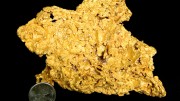Some of us have noticed that there are, indeed, more than a few “weedy and not-very-bright leftists” writing for Canadian newspapers. Some of us have run across “arrogant and abrasive youngsters who substitute ‘commitment’ for insight” in the press. Some of us have listened hard to some bishops and realized that their Graces are, in truth, “jumped-up little twerps.” Some of us recognized that in the old days, Southam management had grown “like a malignant cellular disease.” And if Lord Black leaves the newspaper business, some of us will very much miss hearing him call a spade a spade.
Conrad Black has resigned as chief executive of Hollinger International, remaining at his post at the parent company, Hollinger Inc. Hollinger International, owner of large dailies in Canada, the United Kingdom, Israel and the United States (and, through Hollinger Canadian Newspapers, proprietor of this paper) was facing severe criticism from shareholders, lenders and an internal audit committee over just where the company’s revenue stream goes.
There are serious accusations by institutional shareholders disinclined to jump at shadows. Those have to be answered; but none of this excuses the way the legion of anti-Black propagandists has taken the news. The Globe and Mail, of course, probably just can’t help itself, and has jumped on the story with badly disguised glee, even contentedly describing Black’s newly published biography of F.D. Roosevelt as “logorrheal.” The British Broadcasting Corporation, no friend of Black’s London-based Telegraph, found someone to call him a “verbose, bombastic megalomaniac,” and mentioned he is “a confirmed anglophile,” which in these inclusive days is virtually a criminal accusation at Auntie Beeb.
The centre of Hollinger International’s problems so far is not vituperation from the chattering class but non-competition payments made to Hollinger Inc., and directly to Black and other senior managers, by buyers of some of Hollinger International’s small-newspaper assets in the United States. The parent company got US$16.5 million, Black and David Radler, Hollinger International’s president, each got US$7.2 million, and two other Hollinger International executives, Peter Atkinson and J.A. Boultbee, got US$600,000 each.
That moved the Toronto Star to sneer at Black’s “conceit [in] the implication that he alone represents the true competitive threat to these papers, not the firm all the shareholders own.” Pieties like that aside, without the direct non-competition agreement, there would be little to stop Black and Radler from opening up shop under a different corporate shingle, and — as the Star and Globe and Mail both know — that pair, let loose in a competitive newspaper market, poses a formidable threat under any banner.
Black’s defence is that a failure to document the payments properly, and have them approved by the Hollinger International board or its audit committee, was at the root of the problem, and that there was no impropriety. To that, high-profile lawyer and higher-profile wise-ass Clayton Ruby wrote to the Globe in mock sympathy about “how hard it is to get good underlings these days.” (Dear me, yes. You have to park your own Maserati or who knows what the valet might scratch?)
Rather closer to the point is that it is hard to get a good board of directors these days. The issue of the non-competition payments pales, in purely arithmetical terms, beside the management fees that were transferred up the corporate pyramid to the parent Hollinger Inc. and to Black’s privately owned company, Ravelston Management. Those fees amounted to US$207 million over eight years (1997-2002), and Black conceded that shareholder criticism of the way Hollinger International did business was fair. Yet the improperly approved non-competition payment, not the large management fees, precipitated Black’s resignation. What kind of board sits still for deals like those?
Once we put the semi-quantitative glasses on, large management fees paid to parent companies can be looked at in two ways. They are either a dividend paid preferentially to favoured shareholders, or a way of making non-controlling shareholders carry more of the equity risk in a company. Neither is fair to the other owners.
And the other owners have noticed: to be precise, large institutions have run out of patience with the way Hollinger has managed its money. Their impatience, which boiled over at Hollinger International’s annual meeting in May, got a typical reaction from the chief executive: Black told the meeting that “like all fads, corporate governance has its zealots, and its tendency to excess.” Well, no: transparent management doesn’t go out of style.
But mark that: Black’s reaction was one you might hear from any threatened chief executive, not one unique to him — but you don’t have to look far to find Black’s competitors’ papers talking about his “sense of self-importance,” his “bluster and belligerence, deflection and evasion,” or his “opulence . . . the whole money’s-no-object corporate lifestyle.” Some papers are enjoying this, simply for its value as an opportunity to put the shiv of misrepresentation into someone they openly hate.
Others allege Black has referred to “corporate-governance terrorists.” (After a thorough search, we can find that expression only in a Bloomberg wire service report, and, curiously, in Hollinger International’s own Chicago Sun-Times.) If he really said that, it is not far short of disgraceful; his own newspapers (unlike Reuters and the Associated Press, for example) have been staunch about calling real terrorism by its real name, and throwing the term around loosely in connection with shareholders and their money is intellectually dishonest. And contempt for people whose money is in your business is unworthy.
On the other hand, it could easily be the leftie press putting words in Black’s mouth, which they’ve done quite liberally over the years, and intellectual dishonesty about people they dislike is their stock-in-trade.
Remember, their siren song was not that Black was an unethical businessman. (Several among them think businessmen are unethical by definition, but that is another issue entirely.) Their complaint was that Black was a newsroom oppressor, dictating an editorial line to the papers he owned, the better to pursue his greedy corporate agenda. (If you suppose we overstate their case here, read a little of James Winter’s Democracy’s Oxygen.)
Yet during Black’s time running the Southam dailies through Hollinger, the situation was precisely the opposite — not that the anti-Black faction gave a damn. Black’s National Post was supposed to be his mouthpiece; yet when he made an appearance in its pages, it was normally in the paper’s letters column. Once CanWest Global took up its half- (and then full) ownership of the paper, Israel and David Asper were near-regulars on the Post’s op-ed page. It was CanWest, not Hollinger, that launched the idea of chain-wide editorials, from which individual papers were not allowed to differ.
The “liberal media” have always preferred detesting and defaming Black to debating him. Now the same old bores dance excitedly and sing, “we told you so!” They never told us anything of the sort.



Be the first to comment on "Editorial: Piling on Black"